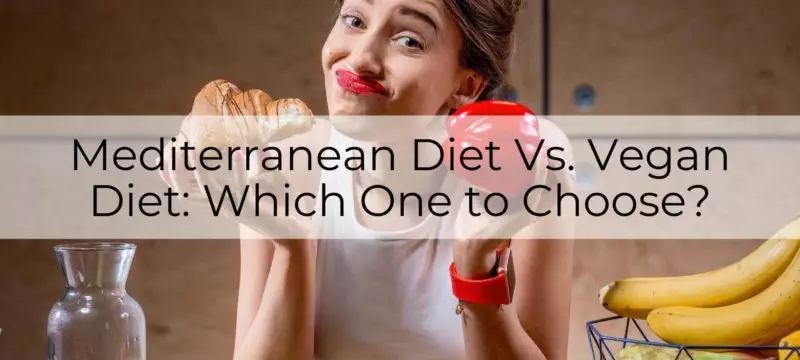
Did you know that there are approximately 79 million vegans worldwide?
Even though 88% of Americans consider themselves omnivorous or carnivorous, about 2% of the people living in the United States are vegetarian, and 0.5% are vegan. [1]
Unfortunately, such statistics are not available for people adhering to the Mediterranean diet. We can estimate that the majority of people living in the countries surrounding the Mediterranean sea follow this diet.
Vegan and Mediterranean diets are both plant-based, focusing on whole foods of plant origin. While both diets can be a healthy choice, there are still some important differences in these two dietary patterns.
This article guides you through the details: Mediterranean diet vs. Vegan diet, health effects, and benefits of eating plant-based.
Let’s get started!
What is Mediterranean diet?
As mentioned, Mediterranean diet is the typical diet of people living in Mediterranean countries. These include Spain, Italy, Greece, and France. [2]

What foods to eat on a Mediterranean diet? [4][5]
- Fruits
- Vegetables
- Legumes
- Whole grains (bread, pasta, and rice are allowed)
- Fish and seafood (at least 2 times a week)
- Nuts and seeds
- Olive oil as primary cooking oil (and other unrefined vegetable oils)
- Poultry and dairy foods (small portions/few times a week)
- Herbs and spices
What is Vegan diet?
Vegan diet focuses on the consumption of plants and foods made from plants. These foods are typically rich in vitamins A, C, E, K, fiber, antioxidants, and phytochemicals. Meat, poultry, dairy foods, eggs, honey, animal fat, and other primary and secondary animal products are excluded from this diet. [6]
Vegan diet food list
- All fruits
- All vegetables
- Grains (wheat, quinoa, oats, cereals, pasta, bread, rice, etc.)
- Soy products (including tempeh, tofu, and edamame)
- Plant-based dairy: milk, yogurt, cheese, etc.
- Legumes (lentils, peas, beans, chickpeas)
- Vegetable and nut oil and butter (sesame, olive, canola, coconut, etc)
- Nuts and seeds

Mediterranean diet vs. vegan: which is healthier
A 2020 study published in the Journal of the American College of Nutrition compared Mediterranean and Vegan diets for 16 weeks. [7] The results from this research showed that:
Other health benefits of vegan diet are improved blood glucose, diabetes management, and reduced risk of colorectal cancer development. [8][9] However, this diet is often linked to low intake of vitamin B12, calcium, iron, and Omega-3 fatty acids. This means that a poorly planned Vegan diet could lead to malnutrition and nutrient deficiencies in the long run. [10]

However, one should not conclude that the Vegan diet is healthier than the Mediterranean diet. Both are healthy. Many research pieces suggest that long term adherence to Mediterranean diet (at least 12 months) is associated with various health benefits [11]:
- Lower risk of diabetes development
- Reduced risk of metabolic syndrome and metabolic-related health conditions
- Lower risk of depression, cognitive decline, and other mental health disorders
- Cholesterol balance
- Blood pressure balance
- Lower risk of cancer development (more research is still needed to fully support this claim)
Benefits of plant-based diets
As mentioned earlier, both Mediterranean and Vegan diets are types of plant-based diets. Other plant-based diets are:
- Vegetarian diet
- Pescatarian diet
- Flexitarian diet
The bottom line is to incorporate more plant-based foods into your diet and lifestyle for optimum health!








